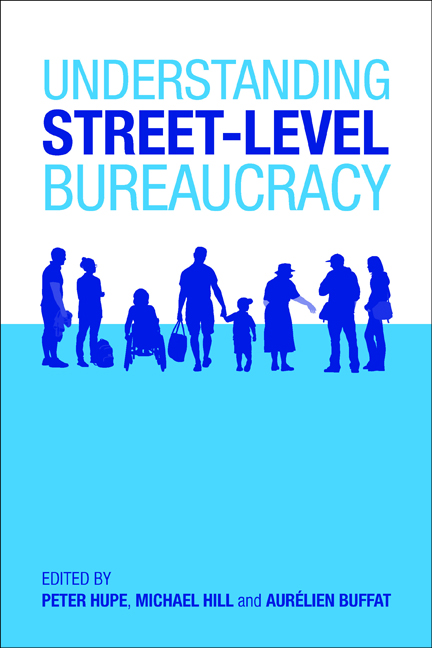Book contents
- Frontmatter
- Contents
- Biographical notes
- Preface
- Part One Introduction
- Part Two Delivering services and benefits: street-level bureaucracy and the welfare state
- Part Three Agents of the state: street-level bureaucracy and law enforcement
- Part Four Embedded in society: street-level bureaucrats as public actors
- Part Five The management of street-level bureaucrats
- Part Six The promise of professionalism
- Part Seven Conclusion
- References
- Index
Sixteen - Professionals and discretion in street-level bureaucracy
Published online by Cambridge University Press: 08 March 2022
- Frontmatter
- Contents
- Biographical notes
- Preface
- Part One Introduction
- Part Two Delivering services and benefits: street-level bureaucracy and the welfare state
- Part Three Agents of the state: street-level bureaucracy and law enforcement
- Part Four Embedded in society: street-level bureaucrats as public actors
- Part Five The management of street-level bureaucrats
- Part Six The promise of professionalism
- Part Seven Conclusion
- References
- Index
Summary
Introduction
Lipsky's (2010, cover blurb) Street-level bureaucrac is a ‘… a cautionary tale of how decisions made by overburdened workers in underfunded government agencies translate into ad-hoc policy changes impacting on people's lives and life opportunities’. It has received plaudits for its enduring contribution to the study of public policy. In this chapter, I want to acknowledge the contribution of Street-level bureaucracy to understanding the limits of managerial control on front-line practice. My main focus, however, is on a critical examination of Street-level bureaucracy, arguing that it constrains the investigation of discretion and limits the exploration of the location, construction and deployment of discretion within welfare services. Street-level bureaucracy does not take sufficient account of the role of different occupational status, particularly professional status, in the construction of discretion or in how discretion may be used in practice. In emphasising both the similarity of all front-line workers and their fundamental difference from their supervisors and managers, Lipksy ignores the ways in which, for professional staff particularly, this distinction is blurred and highly permeable. Street-level bureaucracy also brackets off the discretion of managers – the new organisational professionals par excellence – and characterises their use of discretion as simply motivated to implement the policy that they have been given as best they can. In short, my argument is that Street-level bureaucracy pays insufficient attention to the role of professional status in understanding the discretion granted and used by some front-line staff and by managers within public welfare organisations and the way in which this can influence the extent and use of discretion at different points in implementation. While the chapter does not report on a particular empirical research project, it draws upon my earlier work on discretion in social work practice to explore the adequacy of Lipsky's treatment of issues about professionalism and its management.
In the first section of this chapterm I will outline what I see as the strength of the street-level bureaucracy approach in terms of its critique of the idea of managerial control of front-line discretion, and I will consider the additional resources for discretion available to professional front-line staff. I will then consider the way in which Street-level bureaucracy characterises the uses of discretion as ‘client-processing’ and engages with ideas of professionalism in characterising uses of discretion on the front line.
- Type
- Chapter
- Information
- Understanding Street-Level Bureaucracy , pp. 279 - 294Publisher: Bristol University PressPrint publication year: 2015
- 2
- Cited by



